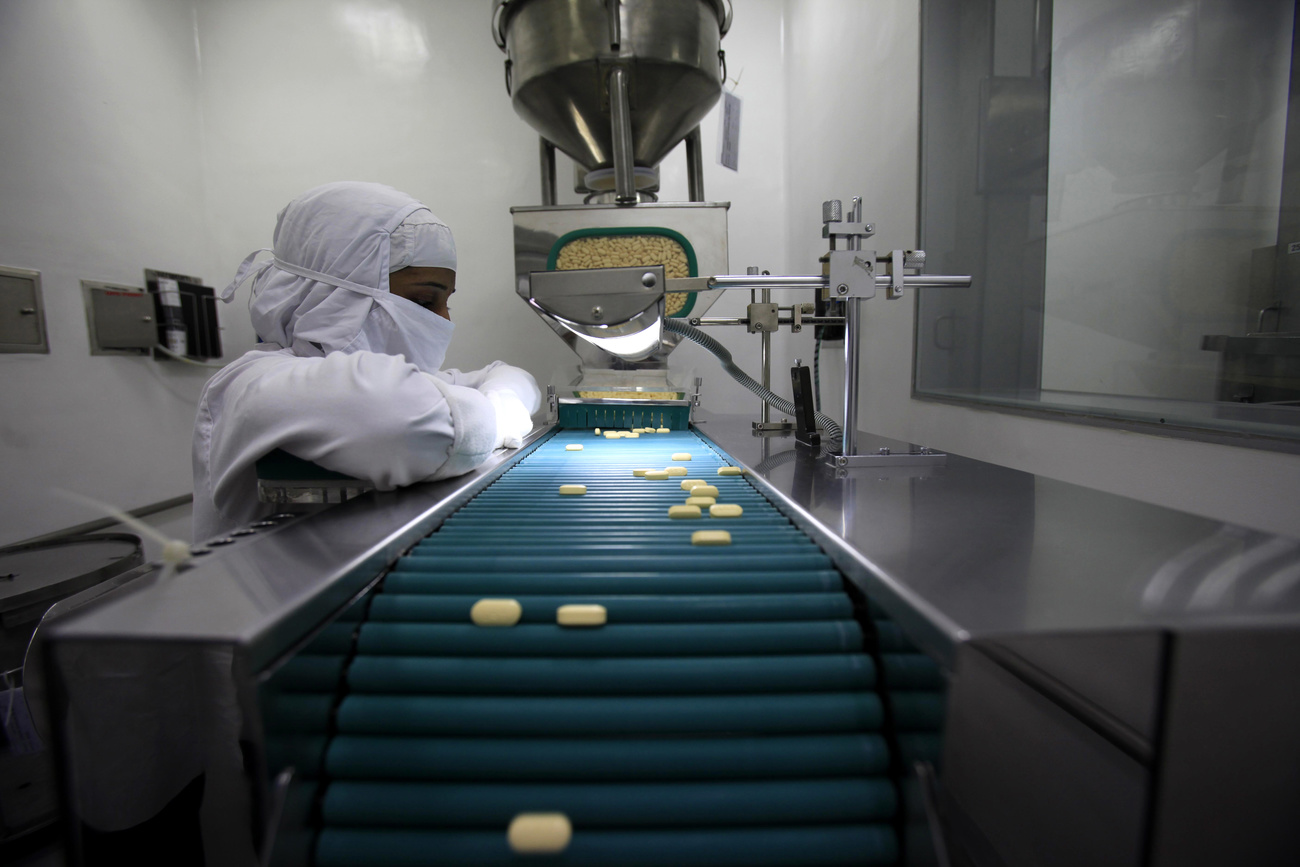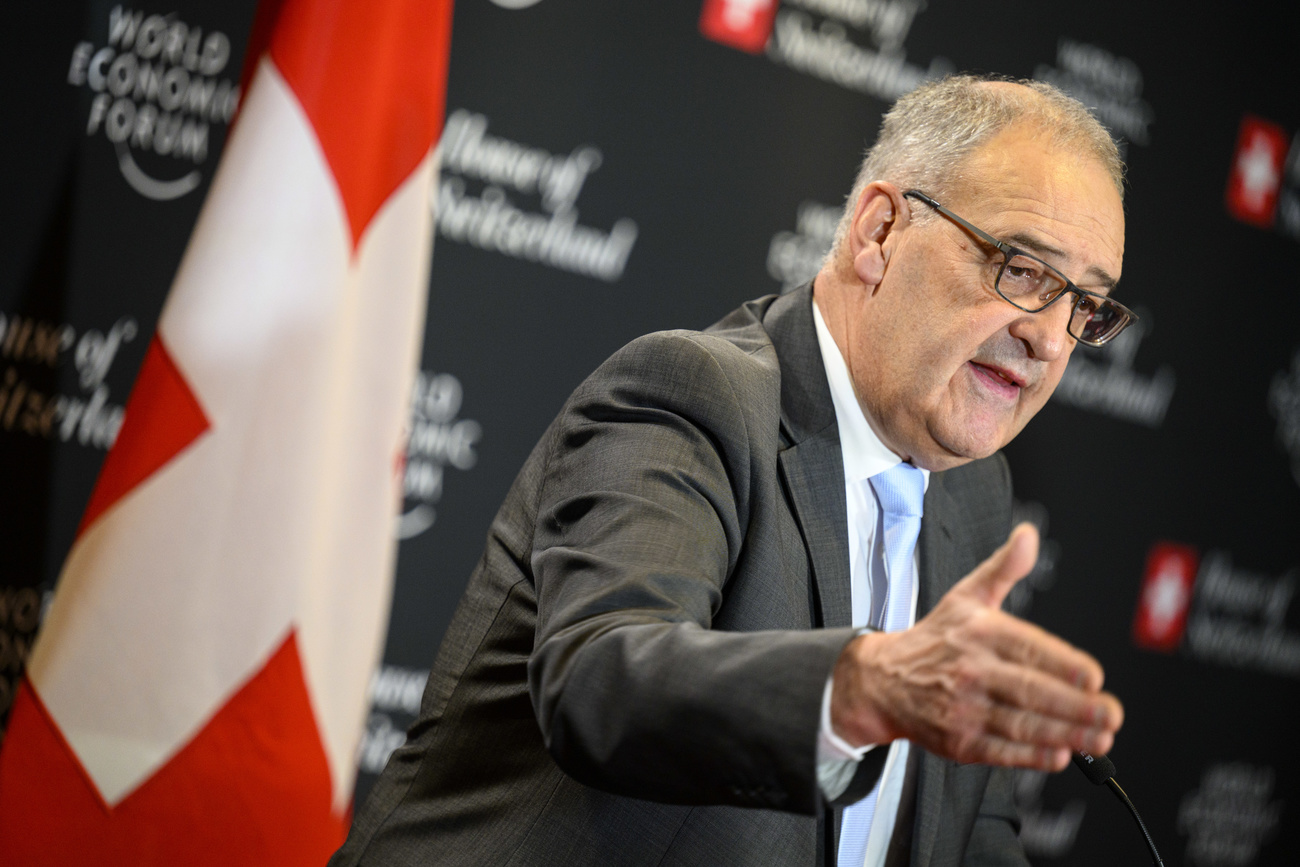
Swiss trade deal: Is India changing its tune on pharma patents?

Intellectual property protection for the Swiss pharmaceutical industry has been a key sticking point in negotiations on a free trade agreement with India. Now there seems to be a breakthrough in talks after 16 years. What’s changed?
In mid-January, Swiss Economics Minister Guy Parmelin flew to India directly from the World Economic Forum in Davos to advance talks on a trade agreement between India and members of the European Free Trade Association (EFTA): Switzerland, Norway, Iceland, and Liechtenstein.
Covid-19 followed by the wars in Ukraine and Gaza have accelerated a structural trend in the works since Donald Trump came into office as President of the United States in 2017: that of redefining globalisation as we have experienced it over the past three decades. On the one hand Western countries weary of the negative effects of open trade policies are resorting to populist and more protectionist measures embracing among others an anti-China discourse. On the other what is referred to as the Global South, want another type of globalisation with their interests at the centre.
These shifts are affecting foreign policies, trade, investment and how global companies position themselves in an increasingly divided world against the backdrop of slowing growth in China.
These include Switzerland’s many multinational companies which benefit from sourcing raw materials from across the globe and sell worldwide. They are dependent on stable commodity prices, fluid supply chains and open markets.
In this series we look at how this geopolitical landscape is impacting Switzerland’s largest global companies. Topics covered include: how China still fares well for some niche high-end consumer goods, reshoring the pharmaceutical industry to Europe, can India be the next China and what a more inclusive globalisation could look like.
He returned full of optimism. Sixteen years after talks were initiated, Parmelin tweeted, there was agreement on the “basic principles” of a free trade deal and the parties had found “balanced solutions to the main open issues”.
One of these issues is intellectual property protection, according to a statement from the State Secretariat for Economic Affairs shared with Bloomberg. The two countries have had different views on what, when and how long inventions can be protected from competition. This was a key reason talks were put on ice back in 2013.
The Swiss pharmaceutical industry, which includes two big drug-makers Novartis and Roche and accounts for around 40% of total exports in Switzerland, has argued for years that stronger patent protection is needed to prevent Indian drug-makers from making copycat generics that eat into their profits.
While the trade agreement isn’t finalised and the draft text hasn’t been shared publicly, any move to strengthen protection of patents for pharmaceuticals would signify a major shift for India, which supplies 20% of the world’s generic medicine.
The big deal about patents
India has long pushed back on attempts by multinational drug-makers to further strengthen patent protection on new drugs. In 2005, India updated its patent law to align with the World Trade Organization rules on intellectual property, known as TRIPS. The law grants so-called originator firms 20 years of patent protection.
However, India has made use of many flexibilities and technical nuances in the WTO rules, including allowing countries to decide what can be patentable. This has allowed India to resist claims by companies to extend a product’s patent life based on changes to a drugExternal link that don’t significantly improve its efficacy or wouldn’t qualify as inventive or novel under Indian law.
India has also made use of compulsory licensing, which allows a country to grant a generic maker the right to break a monopoly on a drug for public health reasons. India has used this when a drug’s price is so high it’s unaffordable.
Such moves have drawn the ire of global pharmaceutical companies, which have become embroiled in legal battles with the Indian government or generic makers.
In 2013, Novartis lost a seven-year legal battle over its cancer therapy Glivec in India. The country’s top court refused marketing exclusivity for a new form of the drug on the grounds that it was not a novel medicine but an amended version of an existing compound.
This has led big global pharma companies to step up their fight to strengthen intellectual property protection in India.
A spokesperson for the economic association of the Swiss chemical, pharmaceutical and life sciences sector, scienceindustries, told SWI swissinfo.ch that it is “imperative that Switzerland advocates for a robust set of intellectual property rules” in the FTA with India. Pharmaceutical companies argue that intellectual property is essential for companies to generate enough revenue to make up for the costs of developing drugs and incentivise further investments in innovation.

More
Swiss economics minister in India for final push on EFTA trade agreement
Switzerland is a world champion in patents, filing more European patent applications per capita in the last decade than any other country.
As outlined on the association’s websiteExternal link, they want free trade deals to include, among other things, patent term extensions to compensate patent owners for time lost due to long regulatory review periods, protection of originator’s safety and efficacy data for preferably ten years, and patents for all types of technological inventions, be they products or processes.
Public health needs
Attempts to change India’s patent law have been met with fierce resistance from public health campaigners. India is the largest maker of generics in the world, and supplies nearly two-thirds of the world’s antiretroviral drugsExternal link.
Delaying the entry of generics would compromise access to affordable medicine for people not just in India but in other developing countries, says K.M. Gopakumar, a legal advisor for the Third World Network who is based in New Delhi. “If you keep the tap off in India, you keep the tap off in the developing world,” he told SWI.
These concerns surfaced again in early February when a draft of the intellectual propertyExternal link section of the trade agreement was leaked. SWI couldn’t verify either the source of the leak or the validity of the document but according to the text, EFTA countries are pushing for stronger patent protection aligned with many Swiss industry demands.

More
Fight over rights to Covid-19 drugs puts Switzerland in a tough spot
Gopakumar warns that the moves would have a “chilling effect” on the Indian generics industry. “Indian law already protects patents so any new measures would be redundant and just serve to increase the legal burden,” he said. “It would further disincentivise the generic industry from even attempting to develop drugs just to avoid the legal battles.”
Patrick Durisch, who leads health policy at the Swiss NGO Public Eye, echoed this, arguing that such moves would just “provide another legal avenue for pharmaceutical companies to sue competitors”.
On February 14, Public Eye wrote a letterExternal link to Swiss government officials expressing concern about “more restrictive and damaging Swiss demands on intellectual property”, warning that they would “unduly strengthen the monopoly rights of the Swiss pharmaceutical industry at the expense of patients in India and beyond.”
The ramifications go beyond Swiss companies though. Any changes to patent law or interpretations thereof in India due to a free trade agreement with EFTA would likely impact any company launching a new drug in India.
Innovation narrative
India’s commerce secretary publicly rejectedExternal link some of the demands mentioned in the leaked document, saying that he stands by the Indian generic industry and that it has nothing to fear from the trade deal.
Nonetheless there are signs things are changing in India, as the country opens more to global trade and seeks to attract foreign direct investment (FDI). It’s unclear if a deal would include investment commitments from EFTA partners.
Over the last five years, Novartis has spent around $300 million (CHF264 million) in creating an R&D support center and services in Hyderabad, India and recently made an investment of $49 million in setting up a new manufacturing plant for cancer medicine in the country’s northwest.
Philippe Reich, chairman of the Swiss-Indian Chamber of Commerce, told SWI that India has a desire to move up the drug-value chain. “The generics industry remains important, but India also wants to build an innovation ecosystem for itself,” said Reich. “It also wants to protect its own innovators,” including Indian start-ups who Reich says are sometimes behaving like Western pharma companies in pushing for patent protection.
Some of these changes are reflected in the country’s draft national pharmaceutical policyExternal link 2030, released last year. It stresses the need for policies that reduce reliance on imports for patented drugs and encourage research-based innovation. It includes reference to patent protection, specifically that “by reinforcing IP safeguards, we not only incentivize pharmaceutical companies to invest in groundbreaking research, but also create an environment conducive to attracting foreign investments and collaborations.”
Last September, India also released a draft revision of its own patent law, infuriatingExternal link patient groups and civil society actors in India, who argue the amendments could undermine public health safeguards and access to affordable medicine.
Public health campaigners are sceptical that all of these changes will benefit patients in India and developing economies. The Indian market only accounts for about 1% of Swiss pharmaceutical exports.
“The Indian government is under pressure from industry lobbies, which argue patent protection is important for innovation,” said Gopakumar. “But the government knows it has to improve the health situation in the country.”
Both India and EFTA are eager to see a deal signed before April, when India holds national elections. After the United States, India is the most important trading country with which Switzerland has not yet concluded a free trade agreement.
Edited by Virginie Mangin/gw. Anand Chandrasekhar contributed reporting to this article.

In compliance with the JTI standards
More: SWI swissinfo.ch certified by the Journalism Trust Initiative





























You can find an overview of ongoing debates with our journalists here . Please join us!
If you want to start a conversation about a topic raised in this article or want to report factual errors, email us at english@swissinfo.ch.